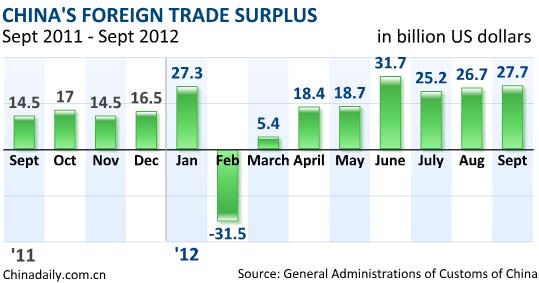

BEIJING -- China's exports and imports picked up in September due to recovering demand boosted by supportive policies at home and abroad, but a strong rebound in foreign trade is being seen as unlikely in the near future.
Exports rose 9.9 percent year-on-year to $186.35 billion in September, according to figures released by the General Administration of Customs on Saturday.
|
 |
September's export volume hit a record monthly high and the growth was higher than the 2.7-percent year-on-year increase posted in August, the GAC said.
The easing of policies by foreign governments and orders for the Christmas shopping season have driven up exports to developed economies, said Chen Hufei, a financial researcher at the Bank of Communications.
Li Jian, a foreign trade expert at the Ministry of Commerce's research institute, said China's own efforts to help trade firms reduce transaction costs and improve efficiency also contributed to the recovery.
Some exporters may have hurried to deliver their orders before the eight-day national holiday beginning September 30 and caused the higher growth in exports in September, Li said.
Imports ended three months of consecutive drops in September, up 2.4 percent from a year earlier to $158.68 billion, according to GAC data.
Chen said import demand has built up on China's pro-growth policies and will continue to increase in the fourth quarter.
Chinese authorities have beefed up incentives to expand imports in order to balance the country's trade.
In its latest move, the government said last week that it would allocate 2.5 billion yuan ($394.9 million) from the central budget to offer loan interest discounts to importers of certain types of products this year.
Although imports remained weak in September, there are fewer chances for further decreases in future, as the economic outlook will improve, Li said.
He predicted that the trade surplus will expand somewhat, but will not take up a larger share of China's total trade or economic output.
In September, China's trade surplus rose slightly to $27.67 billion from $26.66 billion in August, the GAC said.
The global downturn and a sagging property sector softened China's growth to 7.6 percent in the second quarter, the lowest growth rate in more than three years.
To bolster the economy, the Chinese government has reduced interest rates twice this year, cut taxes for small businesses, encouraged private businesses to invest in sectors previously closed to them and fast-tracked construction projects.
Wang Jun, an expert with the China Center for International Economic Exchanges, forecast "relatively severe difficulties" in China's foreign trade for the next one to two years.
In the longer term, China is not likely to maintain the annual export growth of 20 to 30 percent seen in previous years because global demand simply cannot support it, Wang said.
Instead of relying entirely on external markets, China should strengthen its export industry by offering more tax rebates, cutting logistics costs and raising the efficiency of labor, he urged.
China's total foreign trade went up 6.3 percent year-on-year to $345.03 billion in September and expanded 6.2 percent year-on-year to $2.84 trillion in the first nine months, according to GAC data.
In the January-September period, exports grew 7.4 percent from a year earlier to $1.5 trillion, while imports gained 4.8 percent to $1.35 trillion, bringing the trade surplus to $148.31 billion.
During that period, trade with the European Union, China's largest trade partner, fell 2.7 percent year-on-year to $410.99 billion, a wider loss than the 1.9-percent decline seen in the first eight months, the figures showed.
Trade with the United States, the country's second-largest trade partner, increased 9.1 percent to $355.42 billion.
Meanwhile, China's trade with Japan dipped 1.8 percent to $248.76 billion, faster than the 1.4-percent decline recorded in the first eight months.
 Eight of top 10 world's largest tech companies step into the VR world
Eight of top 10 world's largest tech companies step into the VR world
 Skilled man gives new life to antiques
Skilled man gives new life to antiques
 Xiaomi, Hasbro join hands to transform tablet
Xiaomi, Hasbro join hands to transform tablet
 Top five car-hailing apps
Top five car-hailing apps
 Migrant workers back home with their family
Migrant workers back home with their family
 8 trends of major price movements gauging China's economy
8 trends of major price movements gauging China's economy
 Microsoft embraces artificial intelligence
Microsoft embraces artificial intelligence
 Top 10 most expensive housing markets in the world
Top 10 most expensive housing markets in the world